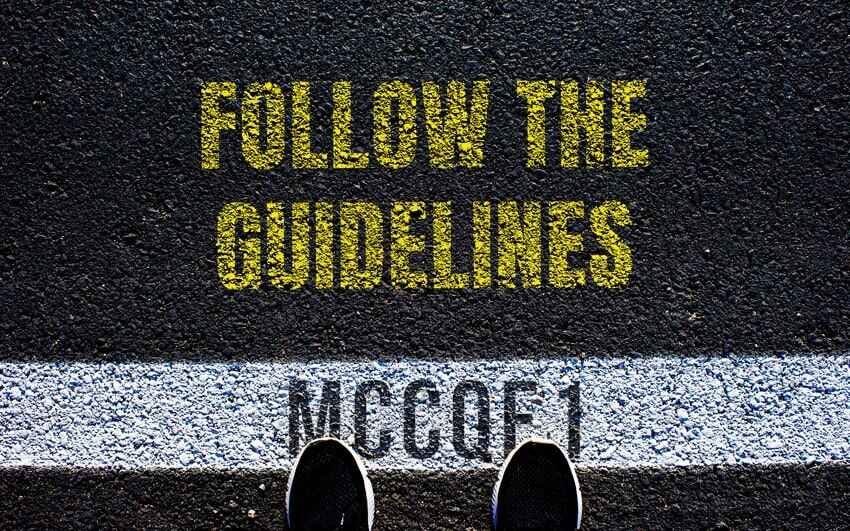Canadian Guidelines for MCCQE1 Exam Prep | Ace QBank

In Canada, medical guidelines are far more than mere checklists. They are the cornerstone of our healthcare. They bind us all together. From veteran doctors to those just embarking on their medical journey.
These guidelines set a common rhythm. Ensuring that every patient receives care grounded in consistency and expertise. For those preparing for the MCCQE1 exam. These guidelines are pure gold. Knowing them inside and out lets you step into the exam with true confidence. Ready to answer each question with authority.
In this post, we will break down why following Canadian guidelines is essential for anyone aiming to succeed on the MCCQE1. We will also explain the reason behind stopping the posting of full guidelines on the blog. Finally, you will see how Ace QBank can help you master the objectives for the MCCQE1.
Why Canadian Guidelines Matter More Than Ever for MCCQE1
The guidelines matter more than ever for the exam. Because they ensure that candidates are prepared in alignment with the standards in clinical practices. And also healthcare expectations unique to Canada.
This alignment is crucial due to the critical role the exam plays in licensing physicians. Who will down the road practice independently within the Canadian healthcare system.
In other words, these guidelines ensure that passing candidates are truly competent to provide safe and evidence-based medical care in Canada.
From my perspective, the importance of guidelines for the MCCQE Part 1 exam can be elaborated as follows:
- Alignment with Canadian Healthcare Standards
- Emphasis on Critical Thinking and Application
Alignment with Canadian Healthcare Standards

The understanding and internalization of Canadian healthcare standards is fundamental. That’s because it shapes the entire context in which medicine is delivered in the country.
On the other hand, the MCCQE1 does not only test medical knowledge. The exam tests whether a practice is safe, ethical and effective. Within the specific legal, social and systemic framework of Canadian healthcare.
Putting these two together reveals the uniqueness of Canadian healthcare. Cultural considerations, epidemiology and healthcare delivery models. Models that differ substantially from other countries, particularly the U.S. For example:
- The publicly funded system requires knowledge of appropriate resource stewardship and patient-centred care tailored to this structure.
- There is a strong emphasis on cultural competence and understanding diverse populations. Including Indigenous health considerations.
- Evidence-based guidelines and practice recommendations that are Canadian specific. Reflecting local population health needs and resources.
What does this mean for those preparing for the exam? Well preparing with non-Canadian resources leads to knowledge gaps that can hurt performance.
Passing the MCCQE1 signals that a candidate is competently aware of Canadian healthcare standards. This ensures that candidates understand the context, rules and expectations for healthcare delivery. Foundational for safe and ethical practice.
Emphasis on Critical Thinking and Application
The questions in the exam are clinically oriented. This means the MCCQE1 focuses heavily on applying knowledge rather than rote memorization.
This emphasis aligns with the realities of daily clinical practice. Where a physician must make nuanced decisions based on incomplete or complex information.
In other words, the exam tests the ability to analyze clinical scenarios critically. Prioritize differential diagnoses and interpret investigations appropriately. Along with select management strategies that are rational, evidence-based and applicable to Canadian practice.
This mimics real-world situations where clinical problems rarely have one right answer. But they have the most correct answer. In order to select the correct answer within the allotted time. You must develop the critical thinking skill to interpret evidence and apply it contextually.
On the flip side, Canadian clinical guidelines emphasize patient-centred care. Along with ethical considerations and interprofessional collaboration.
Therefore, being familiar with guidelines helps you critically appraise clinical cases. And make decisions that are holistic and culturally sensitive rather than algorithmic. This also reflects the CanMEDS framework. The framework which guides physician competencies in Canada includes roles in management and professionalism.
That said, critical thinking and guidelines are equally important. And make sure that you can translate knowledge into sound clinical judgments. One that is tailored to individual patients’ needs and the Canadian system.
Guidelines for MCCQE1 | ||
Aspect | Importance of Guidelines | Details |
Healthcare Standards | Ensures conformity with Canadian clinical practices | Distinct from American or other international standards; bridges knowledge gaps |
Exam Format Adaptation | Prepares for new MCQ-based format in 2025 | Focus on reasoning, clinical decision-making; reduces candidate fatigue |
Critical Thinking & Application | Develops ability to apply knowledge in Canadian clinical settings | Essential for dissecting real-world clinical problems tested in MCCQE1 |
Together, these attributes ensure candidates develop the critical skills needed to succeed both on the MCCQE1 exam and beyond.
Using guidelines during preparation helps you internalize the context in which that knowledge is applied within Canadian healthcare. This means you learn to think critically about clinical scenarios with an understanding of local standards and population health priorities.
Guidelines provide a practical framework that guides decision-making aligned with the exam focus on ethics and evidence-based care. They help you practice interpreting complex cases in a way that mirrors exam questions. Where applying knowledge thoughtfully is far more important than memorizing facts.
Familiarity with guidelines also reinforces essential competencies such as cultural sensitivity, patient-centred care and interprofessional collaboration. All of which are tested implicitly or explicitly in the exam.
.
Why Ace QBank Stopped Posting Canadian Guidelines on the Blog

Imagine trying to learn to drive. While the traffic rules kept changing every few weeks. You would spend more time cross-checking the rule. Then actually practicing behind the wheel. Clinical guidelines work the same way.
In Canada there are more than 150 national and specialty-specific guidelines. These guidelines are revised or replaced every year. And minor updates appear almost monthly.
Posting those documents on a static blog. Quickly turns yesterday’s best advice into today’s liability. That realization sparked a major shift in how Ace QBank delivers guideline content.
Instead of publishing full guideline summaries on the blog. The question bank now embeds guidelines directly into the explanation that follows every practice question.
When you finish a vignette on, say, hypertension management. The explanation section will also show you the most recent guideline.
The best part is that if an update is released next quarter. Our editorial team swaps in the new guideline overnight. And you will see the change the very next time the question appears.
Contextual pairing of question, answer and guideline drives memory consolidation. This means higher retention which will make your MCCQE1 exam prep faster, smarter and more reliable.
This is mainly due to the contiguity effect, also called the contiguity principle. It simply means that our brain’s “glue” for linking ideas. That’s why information is retained more easily when the stimulus and its explanation are presented side-by-side in time and space.
Think of it as mental Velcro. The closer the two pieces of information sit. The more “hooks” they share and the less likely either piece is to slip away later.
How to Integrate Canadian Guidelines into Your MCCQE1 Exam Prep

Canadian clinical guidelines are important for the MCCQE1 exam preparation. Integrating them into your study routine is therefore essential. That is, if you want to move beyond “good guesser” to a confident, evidence-based physician.
The best way to integrate guidelines into your MCCQE1 Exam Prep is to use Canadian resources. Resources that are known to contain the guidelines and constantly update the material on their platform.
Likely, there is one such resource in the entire Canada, and that’s Ace QBank. We will discuss more about this question bank later on in the upcoming section. Here’s a concise list of how to integrate guidelines into your study plan:
- Anchor your study plan in a guideline-centric question bank.
- Use “guideline tagging” to rapidly review
- Map guidelines to MCC objectives, not the other way around.
- Prioritize “guideline volatility” topics.
To effectively prepare, it’s crucial to anchor your study plan in a guideline-centric question bank. Start with a platform that intentionally embeds the latest national recommendations. Rather than simply recycling vintage multiple-choice items.
Ace QBank is indeed a leading Canadian built question bank that cross-references key Canadian bodies. Like Hypertension Canada, Diabetes Canada and the Canadian Paediatric Society. Along with the Canadian Task Force on Preventive Health Care.
Their commitment to updates means that new questions reflect guideline changes swiftly. A crucial advantage is when preparing for the medical licensing exam. The challenging exam that tests the most current clinical knowledge.
This focused approach makes sure you are always learning the most relevant information. Information that is directly applicable to Canadian medical practice.
As you progress through your chosen question bank. Actively flag every question that cites a formal guideline. This process allows you to curate a personalized, high-yield set of questions focused specifically on Canadian guidelines.
Imagine being able to quickly review all questions related to, say, the latest Canadian cardiovascular guidelines just weeks before your exam!
This targeted review is far more efficient and effective. Then sifting through all your summary notes looking for guidelines. This way you streamline your review process and ensure maximum retention of guideline-specific details.
Furthermore, it’s vital to map guidelines to the MCC objectives. You know the same objectives are set by the Medical Council of Canada not the other way around.
Instead of memorizing guidelines in isolation. You should link them directly to these objectives. For example, if a question covers the “management of diabetes” objective. You should directly associate it with the current Diabetes Canada clinical practice guidelines.
This proactive approach ensures comprehensive coverage. And also helps you understand how different guidelines relate to the exam’s structure. It transforms your study from rote memorization into a strategic framework. Making it easier to recall information under pressure. And apply it contextually during the exam.
Finally, be strategic with your time by focusing on important guidelines. Since some clinical guidelines are updated more frequently than others.
Areas like preventive screening and infectious disease prophylaxis. Often see yearly revisions. While trauma algorithms remain relatively stable.
Spend proportionally more time on the high-volatility areas. Doing so guards you against outdated answers that can cost precious exam points.
The Way Ace QBank Prepares You to Succeed in MCCQE1

Preparation for the MCCQE Part 1 needs a strategic and well-planned approach. Imagine stepping into a Prometric Centre.
Your heart is pounding. Yet grounded in an unshakable confidence. That’s what mastery of the MCC objectives and guidelines feels like.
It is that calm in the storm, the steady voice inside your head when everything else clamours for attention. You know you have done the work, dug deep into every standard and recommendation set by our medical community.
And that certainty? It gives you more than knowledge. It grants you power. Power to make decisions with clarity. Power to face challenges head-on without hesitation. How does this feel? Like standing tall on solid ground, right.
That’s why the right resource is the bedrock of your preparation. This is where the platform, like Ace QBank, transforms this challenge into an achievable milestone. Equipping you with high-yield resources tailored to MCC objectives and guidelines.
Let’s dive into how this Qbank is specifically engineered. to ensure you walk into a Prometric Centre with the confidence and competence to succeed.
At the heart of the Qbank lies over 2800 high-yield questions. Each question is a product of careful design, intricately woven around the MCC objectives and the latest Canadian medical guidelines.
This alignment is critical. The MCCQE1 is a Canadian exam. It is designed to assess your ability to practice medicine within the Canadian healthcare context.
Success hinges on your familiarity with these specific standards. from treatment protocols to public health priorities. Thus, the QBank immerses you in questions that mirror the exam’s blueprint. This way ensures you are studying it through the precise lens of the MCC.
True mastery, however, goes beyond simply answering questions correctly. It’s about understanding the ‘why’ behind each answer. This is where the QBank truly shines. It offers comprehensive, evidence-based medicine explanations with every question.
Forget dry, text-heavy rationales. Instead, you will find a dynamic blend of summary tables, diagnostic algorithms and custom medical illustrations.
These visuals are carefully crafted to match the intricacy of each concept. Serving as invaluable tools that deepen understanding and boost memory. They break down complex medical concepts. Turning them into clear, engaging stories that stay with you long after.
Crucially, these tables and flowcharts are constantly reviewed. And updated to reflect the most current guidelines. So your study is always on the cutting edge.
Recognizing that every student’s study plan is unique. The platform offers a structured yet flexible approach. The entire scope of medicine is intelligently divided into 21 distinct categories.
This allows you to build your own study schedule. A schedule that targets your specific strengths and weaknesses. Want to focus on Cardiology for a week? You can. Need to brush up on Psychiatry? No problem.
Moreover, you control the way you learn. You can create question blocks in two strategic study modes. Feeling confident in a subject? Use ‘Timed Mode’ to simulate the pressure of the actual exam, honing your time management skills.
Tackling a more challenging area? Switch to ‘Tutor Mode’ for a non-timed, in-depth learning experience. Where you can focus purely on understanding the material without the stress of a ticking clock. This adaptability empowers you to tailor your preparation to your daily needs.
Finally, the genius feature that sets this QBank apart is its dedicated Self-Assessment for MCCQE1.
This isn’t just another block of questions. The self-assessment is composed of entirely new questions. Distinct from the main bank. This is a deliberate and brilliant design choice. It provides a true, untainted measure of your knowledge and readiness.
Eliminating the bias that can come from repeatedly seeing the same questions. It is the ultimate litmus test. Allowing you to accurately gauge your preparedness. And walk into your exam with the validated confidence that you are ready to excel.
Where Can I Find Free MCCQE Part 1 Sample Questions?

To get access to the free Sample Questions. You will need to sign up for a free demo account. This isn’t just about unlocking questions.
It’s your chance to explore the entire Qbank interface. I believe this hands-on exploration can make a huge difference.
Once you are in, you can test key features like flagging questions for review and highlighting important details. These are features that can really streamline your study sessions. You will also be able to create question blocks and choose from different study modes.
Just like during your real exam practice. This gives you a realistic feel for how the platform supports your learning.
So, take that first step. Sign up for the free demo. Explore and try the questions to see. If this question bank becomes your trusted study companion.
Key Takeaways
Canadian Guidelines Are Essential for MCCQE1 Success. Mastery of Canadian clinical guidelines is critical because the exam tests knowledge and application within the unique Canadian healthcare context. This includes understanding cultural competence (including Indigenous health) and evidence-based, patient-centred care aligned with Canadian standards.
Ace QBank Integrates Canadian Guidelines for Effective Preparation. The QBank embeds the latest guidelines directly into question explanations. Make sure that you study current practices. This integration enhances retention by linking questions to guideline content in a contextual manner. It also allows for rapid updates in response to guideline changes. Making the study more efficient and aligned with MCC objectives.



